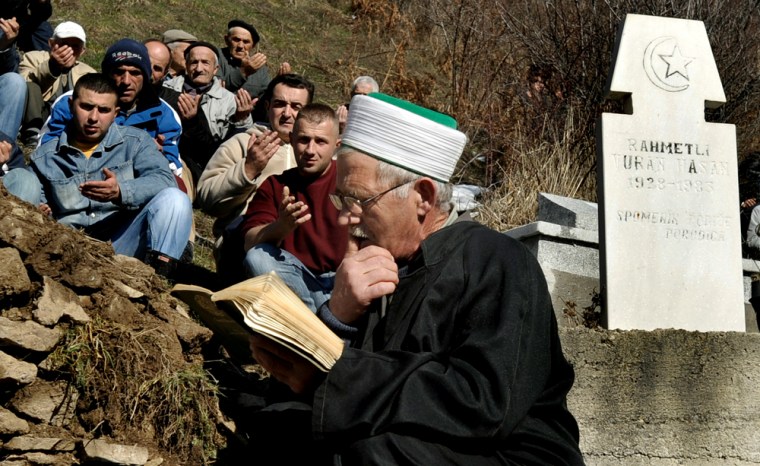When Kosovo declares independence, Sabri Popaj will mark the moment by walking to the village cemetery and running his hand over the headstones that mark his two sons' graves.
Then he'll light a candle next to 14 other graves — all close family members slain by Serbian forces during Kosovo's 1998-99 war.
"There were 22 in my family. Now there's only four of us left," the ethnic Albanian farmer said.
Bela Crkva's graves bear silent witness to how the legacy of the dead has burdened Kosovo's future on both sides of the ethnic divide — not only among the Albanians who survived, but among the Serbs who suffered reprisal attacks in the tense years that followed.
"If they were not killed, there would be no independence," said Popaj, 48. "But when independence comes, it will be a day mixed with joy and sorrow, since I don't have my family to share this with."
Buried on ‘Martyr's Hill’
In March 1999, Serbian troops unleashed a violent rampage on the village, shooting and hacking to death its ethnic Albanian residents. All 67 victims — who included a 2-year-old boy — are buried atop "Martyr's Hill" overlooking the hamlet.
The massacre was part of the U.N. war crimes indictment brought against former Serbian strongman Slobodan Milosevic, who orchestrated the crackdown on Kosovo's pro-independence rebels. Milosevic died in 2005 while still on trial in The Hague, Netherlands.
Kosovo's war, which killed about 10,000 people and made refugees of nearly 1 million others, has indelibly scarred the southern Serbian province, whose ethnic Albanian leadership is expected to formally declare independence within a few days.
Most of the minority Serbs live in Kosovo's north. Many were forced to leave their homes after the war, fearing revenge attacks from ethnic Albanians.
‘An eerie wind blowing’
Serbs still bear a grudge in isolated villages like Staro Gracko, 45 miles east of Bela Crkva.
There, on a scorching summer day in 1999, 14 men were bringing in the wheat harvest as NATO and the U.N. were still moving in to secure the province. Shots rang out, but no one came to help. Later, British peacekeepers found the 14 dead in a field fringed with poplar trees, in an attack blamed on ethnic Albanians.
Local Serb Ljubica Zivic didn't hear the shots that day, but felt an ominous breeze that seemed to foretell that both of her sons, Radovan and Jovica, would not return home.
"I waited and waited. There was an eerie wind blowing," Zivic said, clasping her hands together in grief. "In the evening I went inside and said, 'It's all over.'"
Zivic ekes a living on 40 euros ($60) a month, struggling to feed seven grandchildren who survived their slain fathers. She did not join the 200,000 Serbs who sought shelter in Serbia, some unearthing their dead and carrying away the bones as they left.
Clad head to toe in black, the tiny woman is bound to the dead in a village that now has the air of a ghost town.
"This is my village and this is where my dead are," she said. "I will stay."
Grudges make reconciliation fleeting
Tragedies like these have made reconciliation a daunting task in a Kosovo still gripped by ethnic tensions and bitterness.
For Popaj, the ethnic Albanian farmer, there's no turning back.
"I'd rather die than allow this horror to repeat itself," he said, insisting independence is the only way to move forward — at least for the next generation.
"There is no peace for me," he said, "but there will be for those who follow."
